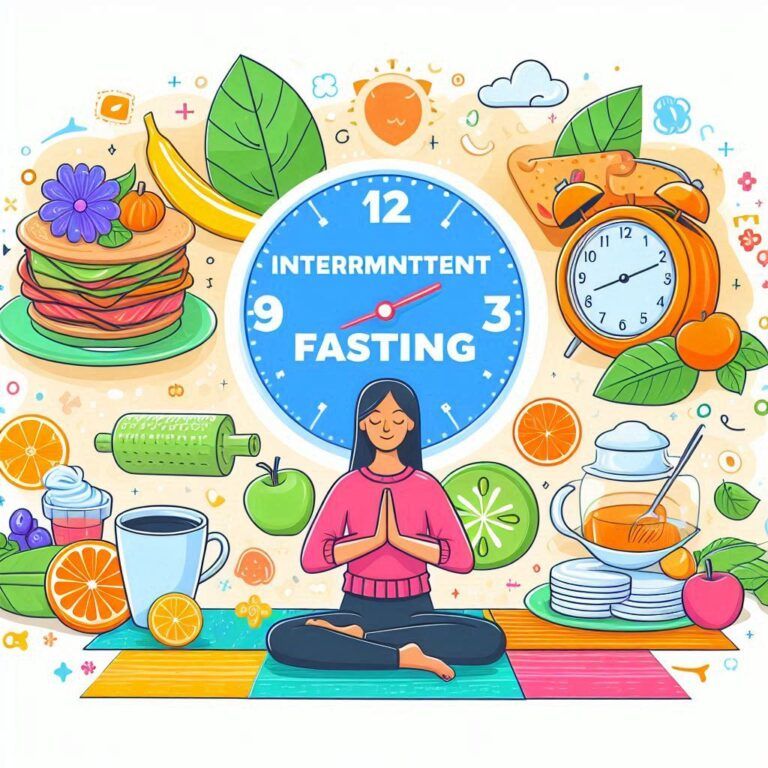Why Am I Gaining Weight On Intermittent Fasting
Have you ever wondered why I am gaining weight through intermittent fasting? Gaining weight on intermittent fasting isn’t supposed to be part of it, yet here you are, stepping on the scale and finding the numbers creeping up. Today, I will explain why this can happen and how it’s not just about fasting but also the big picture of overall calorie management.
It’s a common misconception that simply adopting an intermittent fasting schedule will guarantee weight loss. But here’s the kicker: weight management is fundamentally about calories in versus calories out, and fasting doesn’t give you a free pass to ignore this rule. That’s why, at Calorie Lifestyle, I emphasize the importance of both intermittent fasting and calorie counting.
Therefore, if you consume more calories than your body requires during your eating windows or opt for high-calorie meals lacking nutritional value, you’re hindering your progress and possibly predisposing yourself to weight gain.
This isn’t just about overindulging; it’s also about understanding how your body’s energy works. You’ll learn about the various traps people fall into and how these might be causing the scale to tip in the wrong direction despite your disciplined fasting schedule. It’s about dissecting the myths that lead to frustration and giving you the real deal on what’s happening with your body.
Now, let’s move on to the next section, where you’ll explore the issue of dietary choices more deeply. Poor food choices during critical eating periods play a significant role in unexpected weight gain. I will give you the tools to navigate this territory successfully.

Dietary Choices: A Critical Factor in Weight Control
I’m here to help you understand how dietary choices are crucial in managing your weight, especially when you’re fasting intermittently. It’s not just about the timing of your meals; what you eat is just as, if not more, just as important.
You’ll discover that overeating during feeding can silently push your calorie intake above your goals. It’s easy to miscalculate when you’re hungry after fasting.
Poor food choices can also hinder your weight management efforts. Opting for foods high in calories but low in nutrients does your body a disservice and may leave you less satisfied. These choices can set off a cycle of hunger and overeating, which is counterproductive to the weight loss benefits of intermittent fasting.
Now, this isn’t just about preventing weight gain; it’s also about setting the stage for nutrient-rich food choices that sustain your energy throughout the day. Including foods rich in protein, fiber, and healthy fats helps keep you full and supports a healthy metabolism.
Now, let’s move on to the next section, where you’ll explore the issue of dietary choices more deeply. Poor food choices during critical eating periods play a significant role in unexpected weight gain. I will give you the tools to navigate this territory successfully.
Beyond the Plate: Lifestyle Contributors to Weight Gain
Now, it’s not just the food on your plate that determines whether the number on the scale goes up or down. Lifestyle factors play a substantial role in weight management during intermittent fasting. Get ready to explore how these often-overlooked aspects can impact your progress.
First, metabolic adaptation is your body’s response to reduced calorie intake. When you fast, especially for prolonged periods or with severe calorie restriction, your body might slow down its metabolism to conserve energy. This biological attempt at efficiency can make it harder for you to shed pounds.
Hormones are another player in this game. Chronic stress can lead the body to ramp up cortisol production, which not only causes cravings for unhealthy foods but may also favor fat storage around your abdomen. Let’s not forget insulin sensitivity—if your cells become less responsive to insulin, your body might be more inclined to store fat than use it for fuel.
Engaging in physical activity boosts your body’s calorie-burning throughout the day, while being sedentary burns fewer calories. If you spend too much time sitting and need more time moving, you’re not burning calories at an optimum rate, which can stall weight loss efforts. Furthermore, a post-exercise appetite increase can lead some to consume more calories than they’ve just burned.
I’m also going to touch on hydration. It seems simple, but the body’s water balance is crucial. High sodium intake can trigger water retention, making you feel bloated and adding temporary water weight. Not drinking enough water can cause your body to hold onto fluids, trying to keep its valuable water reserves on lockdown.
Finally, let’s talk about sleep. Quality sleep is pivotal in regulating hunger hormones like ghrelin and leptin. If you’re cutting corners on sleep, you’re likely to face a lousy appetite the following day, which can lead to overeating and, consequently, weight gain.
Harnessing the Power of Intermittent Fasting for Weight Management
Intermittent fasting isn’t just a method of weight control; it’s a lifestyle. Your fasting journey is influenced by everything you do, from the food you choose to the quality of your sleep.

You learned about the importance of caloric intake, food quality, activity levels, stress, and sleep, but remember, your first attempt at (IF) doesn’t need to be your last. Fine-tuning your approach is part of the process; you can constantly adjust your strategies.
If you’re feeling overwhelmed by weight gain when you expected the opposite, take a deep breath and reassess. Focusing on the strategies mentioned here can help you get back on track with your intermittent fasting journey.
Fasting is a journey, and setbacks happen. Here are some ways to keep moving forward: practice mindful eating, increase your activity, or consult a professional for a tailored plan.
Addressing every aspect with care and attention will create a strong foundation for effective weight loss or maintenance.
Thanks for joining me on this exploration of weight management through intermittent fasting. I look forward to your progress and insights – so keep me posted!
Ask Questions: If you found this helpful, read my article on the Intermittent Fasting Schedule: the Best Times To Eat. If you have any questions, leave them in the comments below. Thank you!








Great insights on the lifestyle factors affecting weight management during intermittent fasting! I’m particularly interested in the concept of metabolic adaptation and how it can hinder weight loss progress. Do you have any recommendations on how to reverse or mitigate metabolic adaptation to ensure our metabolism continues to function effectively during intermittent fasting? Also, any specific tips on maintaining insulin sensitivity would be incredibly helpful. Thanks for shedding light on these often-overlooked aspects!
-Allie 🙂
Hi Allie,
Thank you for your kind words and insightful questions!
Metabolic adaptation can indeed be a challenge when it comes to weight loss. To mitigate or reverse metabolic adaptation, consider the following strategies:
Calorie Cycling: Alternating between higher and lower calorie days can prevent your body from adapting to a consistent caloric intake.
Strength Training: Incorporating resistance training helps preserve muscle mass, supporting a healthy metabolism.
Adequate Protein Intake: Ensure you consume enough protein to support muscle maintenance and overall metabolic function.
Maintaining insulin sensitivity is also crucial. Here are a few tips:
Balanced Diet: Focus on whole foods, fiber-rich vegetables, lean proteins, and healthy fats to maintain steady blood sugar levels.
Regular Exercise: Both aerobic exercise and strength training can improve insulin sensitivity.
Adequate Sleep: Ensure you get enough rest, as poor sleep can negatively impact insulin sensitivity.
As for a product, I recommend trying the Women’s Ripped Vitapak® Program from GNC. This comprehensive program offers targeted energy, metabolism, and overall health support. It includes a blend of essential vitamins, minerals, and other nutrients to support weight management and enhance metabolic function. Many users find it beneficial to maintain their energy levels and support their fitness goals.
I hope these tips help you on your intermittent fasting journey!
Best regards,
Michael